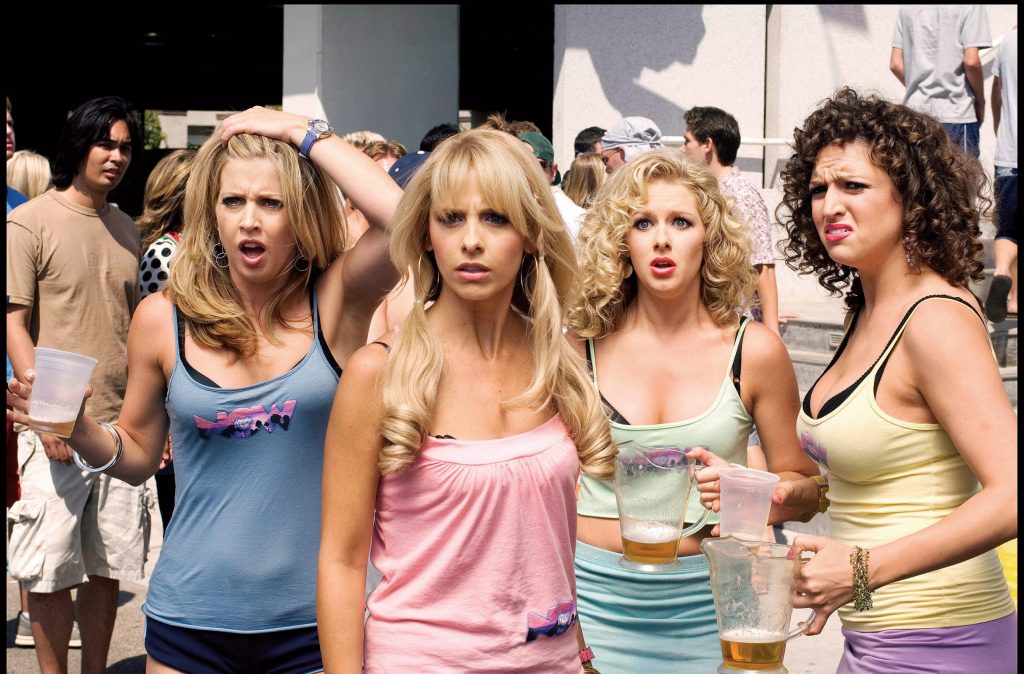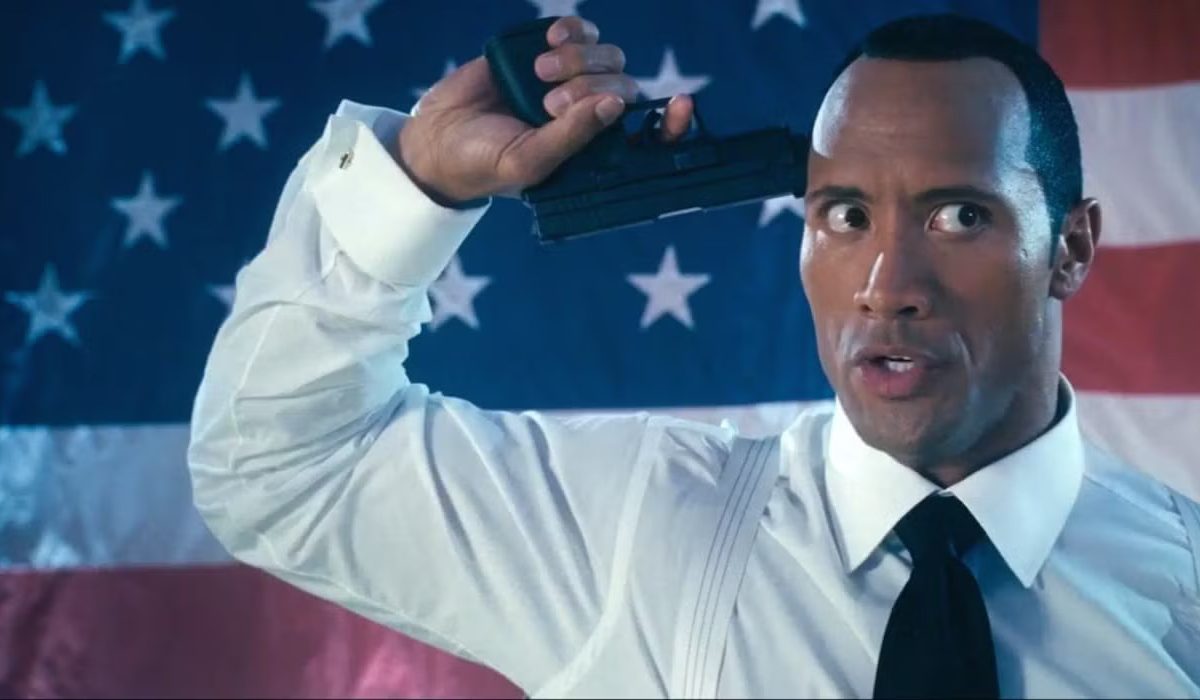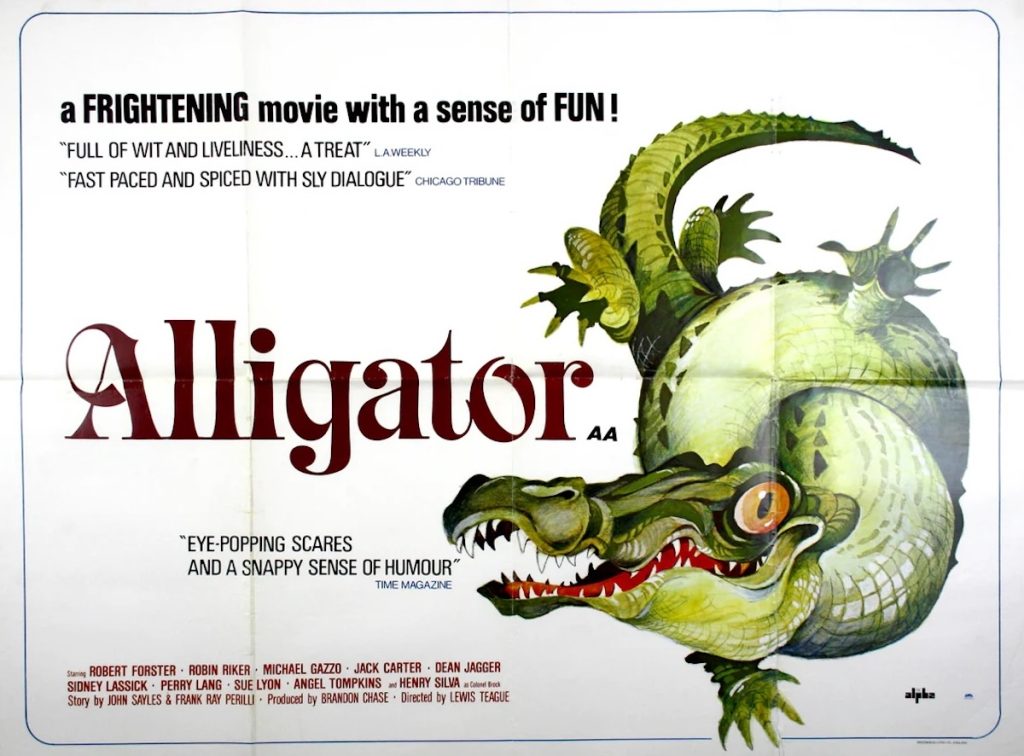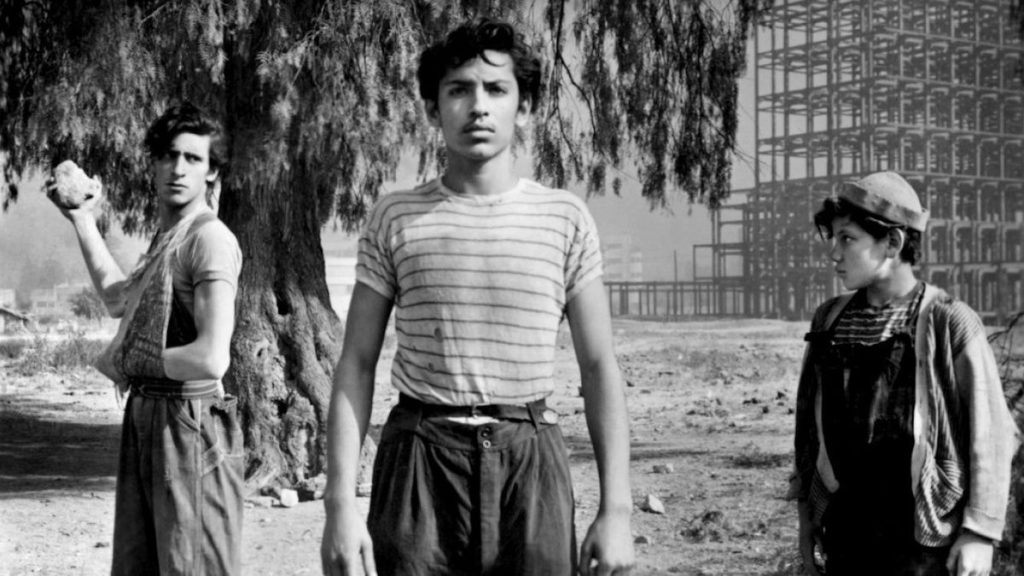We live in interesting times, but they’re also extremely stupid. The endless siege of kayfabe and fascistic slop that permeates every corner of our lives is simultaneously terrifying and asinine. Artists trying to capture the specifics of this era risk over-intellectualizing that which can be best described as dumb and depressing. Perhaps the only honest artistic way to convey the madness of modern American tyranny is through a film that is that unique blend of hyper-ambitious and absolutely frazzled.
Upon its premiere at the 2006 Cannes Film Festival, Richard Kelly’s Southland Tales was immediately written off as a trainwreck. Salon’s critic declared it to be “about the biggest, ugliest mess I’ve ever seen.” It didn’t play much better in American cinemas, with reviews like those of Richard Roeper lambasting it as “two hours and twenty-four minutes of abstract crap.” It is a mess, a harried mish-mash of ideas and grandeur that plays like a David Lynch directed Saturday Night Live sketch movie. Kelly, who had made a huge impact with his remarkably confident debut Donnie Darko, had so many things to say, and keeping up with it proved too much for most viewers. Even its biggest defenders know it’s too messy to fully work. But the stuff that does work? It feels downright prophetic.
In the alternate 2008 of Southland Tales, America is engaged in World War 3. Following a devastating terrorist attack in Texas, the government expanded the Patriot Act to include full surveillance of on- and offline life. The wife of the GOP’s Vice Presidential candidate runs the surveillance agency. His son-in-law (Dwayne Johnson) is a conservative Hollywood actor who’s gone missing and is now living as an amnesiac with a porn star (Sarah Michelle Geller). A group of left-wing revolutionaries known as the Neo-Marxists have kidnapped identical brothers (Seann William Scott) to help them stage a racially-motivated murder. A weird German scientist (Wallace Shawn) has created perpetual motion energy. Justin Timberlake is narrating it all. And then time travel enters the equation.
It’s not hard to see how Kelly thought he could pull this impossible blimp ride of genres and themes off. After all, Donnie Darko works, with a tight plot and metaphysical trappings that combine teen isolation, suburban hypocrisy, and a bunny haunting. The scale of Southland Tales is far wider than its predecessor, a State of the Nation parable concerned with nothing less than the end of the world. It’s as earnest as Donnie Darko, but with the self-conscious camp of contemporary reality TV. Where Donnie Darko deftly blends ‘80s high school drama with a mental health allegory of fourth-dimensional magnitude, Southland Tales turns the volume up tenfold and yells about its fears. It’s a Fox News bulletin of subtlety and gentleness, much like 2008 itself was.

It’s tough to overstate how Southland Tales might be the most 2007 film ever made. It is a manic creation of the George W. Bush era, populated by pre-social media teen icons, SNL comics, and Bai Ling, all while music by Moby and Muse plays. The villains are Republicans and oligarchs who seem to take sexual pleasure in violating civil liberties. America’s presence in the Middle East is a never-ending cycle of death and trauma. A fitting subtitle for it all would be “9/11 Broke Our Brains.”
To the extremely game cast’s credit, everyone is committed to the material that few of them likely understood. Dwayne Johnson, before he reinvented himself as a megastar brand, is great as a macho movie-star who turns into a trembling toddler the moment he’s confronted with real danger. Cheri Oteri chews every scene with the kind of manic comedy zeal that made her an SNL standout. Seann William Scott wrings real pathos out of some of the most ludicrous lines in modern cinema (“Pimps don’t commit suicide!”) It’s a more intentionally funny film than it got credit for at the time, although its aching earnestness cannot help but slide things back into the “unintentional” zone. The presence of these of-their-era teen stars adds a strikingly meta quality to Kelly’s overcrammed vision: why wouldn’t a tale of capitalism and a right-wing cultural takeover be populated by The Rock, Stifler, and Buffy the Vampire Slayer?
One is likely to be driven mad by prophecy. Kelly’s attempt to capture the typhoon of contradictions of his hyper-specific moment in American history only proved how bad things were going to continue to get. While the entire film is imbued with a very pre-Obama liberal feistiness, its ludicrous details are also often bleak as hell: the total lack of privacy under the Patriot Act’s overreach, the racist cops and their crimes becoming viral videos, the mainstreaming of pornography and emergence of the reality TV celebrity, tech bros greenwashing their environmental destruction, and the consequences of nationwide collective trauma. Perhaps it’s less prophetic than it is a mirror of what we all knew was to come. Even Kelly probably couldn’t have predicted a UFC fight taking place at the White House.
In that context, it’s somewhat inevitable that Southland Tales, the most post-9/11, Bush-era spectacle of sound, fury, and dance numbers would be both fascinating and kind of aggravating to watch. It’s like trying to find a cohesive throughline from the ramblings of an intoxicated street preacher, or adapting the words of Nostradamus into a Spike TV series. It asks too many questions and offers zero answers. But how could it do anything else? Consider Southland Tales as a progenitor to something like Ari Aster’s Eddington, the COVID Western that exposed how Trumpism and pandemic lockdown helped to birth our era of paranoid brainrot. Being confronted by your species’ idiocy is tiring, but there’s an honesty to it. The conspiracies never had to make sense to get people to believe them.
“Southland Tales” is available for digital rental or purchase.



